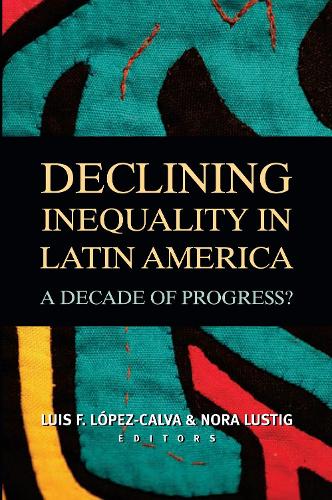
Declining Inequality in Latin America: A Decade of Progress
(Paperback)
Publishing Details
Declining Inequality in Latin America: A Decade of Progress
By (Author) Luis Felipe Lopez-Calva
Edited by Nora Claudia Lustig
Bloomsbury Publishing PLC
Brookings Institution
28th May 2010
United States
Classifications
Professional and Scholarly
Non Fiction
Development studies
339.2098
Physical Properties
Paperback
264
Width 153mm, Height 229mm, Spine 15mm
399g
Description
"
Latin America is often singled out for its high and persistent income inequality. Toward the end of the 1990s, however, income concentration began to fall across the region. Of the seventeen countries for which comparable data are available, twelve have experienced a decline, particularly since 2000. This book is among the first efforts to understand what happened in these countries and why.
Led by editors Felipe Lpez-Calva and Nora Lustig, a panel of distinguished economists undertakes in-depth analyses of Argentina, Brazil, Mexico, and Peru. In addition, they provide essential background in the form of overviews of the relationship between markets and inequality, the political economy of redistribution, and the evolution of income inequality in the advanced industrialized economies. Two factors account for much of the decline in inequality: a decrease in the wage gap between skilled and low-skilled labor, and an increase in government transfers targeted to the poor.
Thanks to the timeliness and sophistication of these essays, Declining Inequality in Latin America is likely to become a standard reference in its field.
"Reviews
"Why is inequality finally declining in a region marked by uncommonly high and
previously persistent income disparities And what does it imply for the future In this
excellent book, Lpez-Calva, Lustig, and their outstanding team of authors do not shy
away from the complexity inherent in the interaction of economics, policy, and politics
that lay behind changes in the distribution of incomes." Francisco H. G. Ferreira, Deputy Chief Economist for Latin America,World Bank
"A work of both exceptional scholarship and practical policy assessment on Latin
America's most intractable, and potentially explosive, challenge the massive income
and wealth inequality that characterizes most countries of the region. Its findings and
conclusions should set the stage for distinguishing between serious policy efforts to build
more equitable societies in Latin America and the demagoguery that pervades so much
of the region's politics." Peter Hakim, President, Inter-American Dialogue
"This very important book documents a surprising decline in income inequality
throughout much of Latin America and analyzes the long-term effects of education
expansion and anti-poverty programs. Its findings have major implications for policy and
political economy analysis. It will be of great interest to anyone concerned with issues of
social development in Latin America, including economists, political scientists, and the
policy community." Robert Kaufman, Rutgers University
"An excellent and necessary book that will be welcomed by all interested in Latin
America's development.Through a mix of analytical essays, abundant empirical evidence,
solid economic analysis, and individual country case studies, the contributors to this
volume help us understand one of the most difficult and, until very recently, persistent
features of the region: high income inequality." Santiago Levy, Vice President,
Inter-American Development Bank.
"This important book shows how markets and policy are beginning to favor the poor in
Latin America. Declining Inequality is a must-read for all those worried about the huge
economic distance between rich and poor in the world's most unequal place." Jeffrey G. Williamson, Harvard University and University of Wisconsin
Author Bio
Luis F. Lopez-Calva is chief economist at the Regional Bureau of Latin America and the Caribbean of the United Nations Development Programme (UNDP).Nora Lustig is Samuel Z. Stone Professor of Latin American Economics at Tulane University and a nonresident fellow at the Center for Global Development and the Inter- American Dialogue in Washington, D.C.
